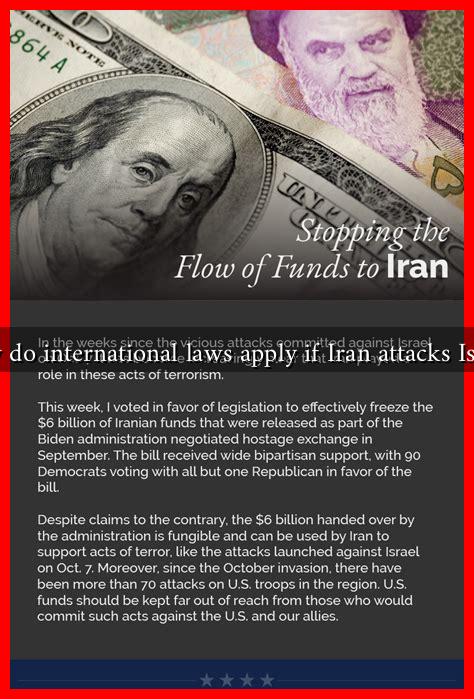-
Table of Contents
How Do International Laws Apply If Iran Attacks Israel?
The geopolitical landscape of the Middle East is fraught with tension, particularly between Iran and Israel. An attack by Iran on Israel would not only escalate military conflict but also raise significant questions regarding international law. This article explores the implications of such an event under various international legal frameworks, including the United Nations Charter, customary international law, and the laws of armed conflict.
The United Nations Charter and the Use of Force
At the heart of international law regarding the use of force is the United Nations Charter, particularly Article 2(4), which prohibits member states from using force against the territorial integrity or political independence of any state. However, there are exceptions to this rule:
- Self-Defense: Article 51 of the UN Charter allows for self-defense if an armed attack occurs against a member state.
- UN Security Council Authorization: The Security Council can authorize the use of force to maintain or restore international peace and security.
If Iran were to attack Israel, it would need to justify its actions under these exceptions. For instance, Iran might claim that its actions are a form of self-defense against perceived threats from Israel.
. However, the international community would likely scrutinize this justification, given Israel’s established military capabilities and its history of defensive actions.
Customary International Law and State Responsibility
Customary international law, which consists of practices that states follow out of a sense of legal obligation, also plays a crucial role in this context. If Iran were to attack Israel, it could be held responsible for violations of international law, including:
- Violation of Sovereignty: An unprovoked attack would violate Israel’s sovereignty, a principle upheld in international law.
- War Crimes: If the attack involved targeting civilians or civilian infrastructure, it could constitute a war crime under the Rome Statute of the International Criminal Court (ICC).
In this scenario, the international community might respond with sanctions or other measures to hold Iran accountable for its actions. Historical precedents, such as the international response to Iraq’s invasion of Kuwait in 1990, illustrate how states can be held accountable for violations of international law.
The Role of International Organizations
International organizations, particularly the United Nations, would play a critical role in responding to an Iranian attack on Israel. The Security Council could convene to discuss the situation and decide on appropriate measures, which may include:
- Condemnation: A formal statement condemning the attack could be issued.
- Sanctions: Economic or military sanctions could be imposed on Iran.
- Military Action: In extreme cases, the Security Council could authorize collective military action against Iran.
For example, in 2011, the UN Security Council authorized military intervention in Libya to protect civilians during the civil war, demonstrating its capacity to respond to threats to international peace and security.
Case Studies and Historical Context
To understand the potential ramifications of an Iranian attack on Israel, it is essential to consider historical case studies. The 2003 invasion of Iraq by the United States, justified on the grounds of self-defense and the need to eliminate weapons of mass destruction, faced significant international criticism and raised questions about the legality of preemptive strikes.
Similarly, the 2014 conflict between Russia and Ukraine highlighted the complexities of international law regarding territorial integrity and state sovereignty. Russia’s annexation of Crimea was widely condemned and led to sanctions from Western nations, illustrating how international law can be invoked in response to aggressive actions.
Conclusion: The Complexities of International Law
In summary, if Iran were to attack Israel, the situation would invoke a complex interplay of international laws and norms. The UN Charter would serve as a primary framework for assessing the legality of the attack, while customary international law would provide additional grounds for accountability. The role of international organizations would be crucial in determining the global response, which could range from diplomatic condemnation to military intervention.
Ultimately, the application of international law in such a scenario underscores the importance of maintaining diplomatic channels and conflict resolution mechanisms to prevent escalation and uphold global peace and security. For further reading on international law and conflict, you can visit the [United Nations website](https://www.un.org/en/sections/issues-depth/international-law/).





